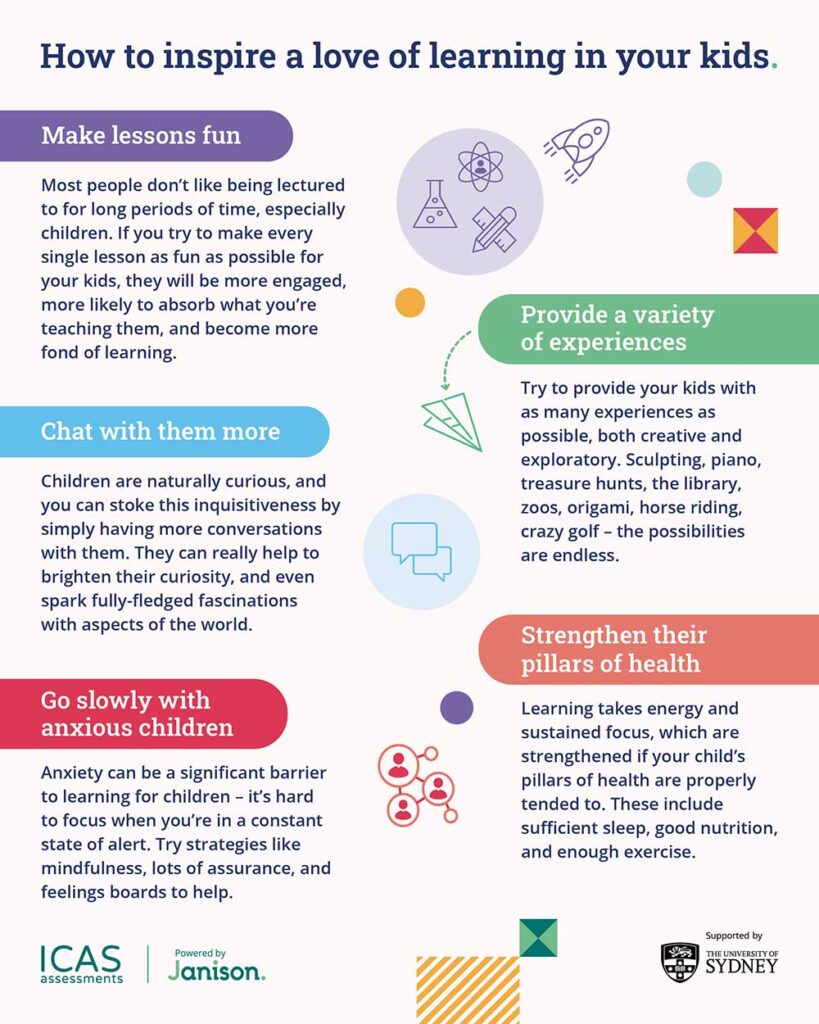How to inspire a love of learning for your kids

Our world is a complex, fascinating place. For your children to successfully manoeuvre their way through it, they’ll spend a lifetime learning about its various things and processes, trying to earn the necessary wisdom for happy, prosperous lives.
And if your children truly love learning, gladly seeking out information and expanding their skills all by themselves, their chances of happiness and prosperity are improved – perhaps drastically. The masters of life are masterful learners. They are fully engaged with the world, and the world rewards them.
In this article, we explore what a love of learning looks like for your children or students, and explore some ways that you can develop this crucial character trait.
What does a love of learning look like?
 Children who love to learn are curious, tenacious, autonomous, and more. Photo by Andrea Piacquadio
Children who love to learn are curious, tenacious, autonomous, and more. Photo by Andrea Piacquadio
Children (and adults) who love learning tend to share the following characteristics:
- Highly curious – they are intrigued about the world and its various workings, and so naturally motivated to learn more about it. They ask tonnes of questions (in their heads or out loud) and are sincerely interested in the answers. Finding out is fun!
- Tenacious – the desire to learn comes from within, which makes them more resilient when faced with challenges. The intrinsic, internal drive to learn new things is a powerful force that helps them persevere. Failures aren’t a reflection of their character, they are a sign to work harder (growth mindset).
- Autonomous – children who love learning don’t need to be coaxed with proverbial carrots, because learning is a reward all by itself. This makes them highly independent and self-directed, leading to a steady sense of confidence.
- Resourceful – when challenges arise with learning, children who enjoy the process are more likely to dig deep and discover solutions. They delve into their minds and work harder with their peers to overcome the challenge.
- Have leadership qualities – because a love of learning builds confidence, these children may be happier to take charge and lead their peers through tasks. Their enthusiasm can be infectious and motivate their team to achieve.
5 ways to develop a love of learning in children
As a teacher or parent, there are a number of ways you can instil a love of learning in your children. Here are some of the most effective:
1. Make lessons fun
Most people don’t like being lectured to for long periods of time, especially children. If you try to make every single lesson as fun as possible for your kids, they will be more engaged, more likely to absorb what you’re teaching them, and become more fond of learning.
There are many ways to make lessons fun, but here are a few key tips:
- Use hands-on learning. Trying to teach your children about gravity? Ask them to (safely) drop marbles, lego blocks, and feathers and discuss how they behave differently. Want them to understand how object colours can change from place to place? Ask them what the colour the ocean is, ask what colour that same water might look like in a glass, then show them. These kinds of hands-on, concrete examples are so much easier for children to understand.
- Use real-world examples. Similarly to the above, as often as possible, tie the lesson back to real-world things your children are familiar with. Abstract principles like fractions become clearer when likened to apple pies or wheels of cheese.
- Ask them to work together. Studies show that group work encourages students to become active participants in their learning, helps them develop key soft skills, and leads to a deeper understanding of the content being learned.1 It can also be fun to work with your peers!
2. Provide a variety of experiences
“Try to provide your kids with as many experiences as possible, both creative and exploratory. Sculpting, piano, treasure hunts, the library, zoos, origami, horse riding, crazy golf – the possibilities are endless.”
 The more experiences your child has, the more chance they’ll find things they love, and love learning about. Photo by Andrzej Mucka
The more experiences your child has, the more chance they’ll find things they love, and love learning about. Photo by Andrzej Mucka
Painting, drawing, building, dancing…a world of possibilities await. There are so many fun creative experiences your children might enjoy if given the chance. And once they find something they enjoy, their determination to improve can be bolstered dramatically, and any difficulties they face are just blips in an ocean because they love the challenge of learning.
Try to provide your kids with as many experiences as possible, both creative and exploratory. Sculpting, piano, treasure hunts, the library, zoos, origami, horse riding, crazy golf – the possibilities are endless. Help them discover their passions, and then feed those passions. Learning won’t feel like work, and their motivation to improve will filter through to other areas of their lives.
3. Chat with them more
Children are naturally curious, and you can stoke this inquisitiveness by simply having more conversations with them. If your daughter seems fascinated by a lunar eclipse, ask her why she thinks it’s happening, and explain it if needed (you can always use Google for help). If your son seems confused about why next door’s bulldog always barks when their doorbell rings, get him to consider why it might be doing so.
Encourage them to think critically by simply asking them questions, then continue chatting to them. These important little conversations can really help to brighten their curiosity, and even spark fully-fledged fascinations with aspects of the world. Who knows – the engaging chats you have with your daughter about soccer might help her to become a proud Matilda.
4. Strengthen their pillars of health
Learning takes energy and sustained focus, which are strengthened if your child’s pillars of health are properly tended to. These are:
- Sleep – you’ve probably experienced how difficult it is to concentrate after a poor night’s sleep, and your kids are no different. It’s fundamental for learning and our overall health. Pre-schoolers need 10 to 13 hours (including naps), grade-schoolers need 9 to 11 hours, and teens need 8 to 10 hours.2
- Nutrition – a healthy, balanced, varied diet will give your children the nutrients they need to become effective learners. A poor diet is associated with behavioural problems, sleep issues, and most importantly for learning, poor concentration.3
- Exercise – just as with adults, children benefit immensely from exercise. It improves their sleep, their confidence / self-esteem, their concentration, and so much more.4 It’s another crucial pillar that can help them become better learners, strengthening their enjoyment of learning as they go.
5. Go slowly with anxious children
Anxiety can be a significant barrier to learning for children – it’s hard to focus when you’re in a constant state of alert. But there are a few strategies that you can use as teachers or parents to reduce anxiety levels and help your kids focus on their learning:
- Mindfulness – take a few minutes to complete a mindfulness practice such as breathing exercises, labelling sights or sounds, or colouring.
- Don’t push too hard – anxious children go at a slower pace than others, so allow them to take their time and contribute on their own terms. Coaxing them out of their shells is a delicate task.
- Provide plenty of assurance – if they’re doing well, praise them! This is especially important if they are being braver than usual.
- Feelings boards – a board where children can attach their photos to different emotions – worried, sad, angry, etc. This helps to express their emotional experiences, and tells them they’re perfectly valid.

References
- Group Work, UNSW Sydney
- Healthy sleep in children, Children’s Health Queensland Hospital and Health Service
- Nutrition – school-age to adolescence, The Royal Children’s Hospital Melbourne
- Children – keeping them active – BetterHealth Channel
Cover image by Pixabay.
Tag:Learning



